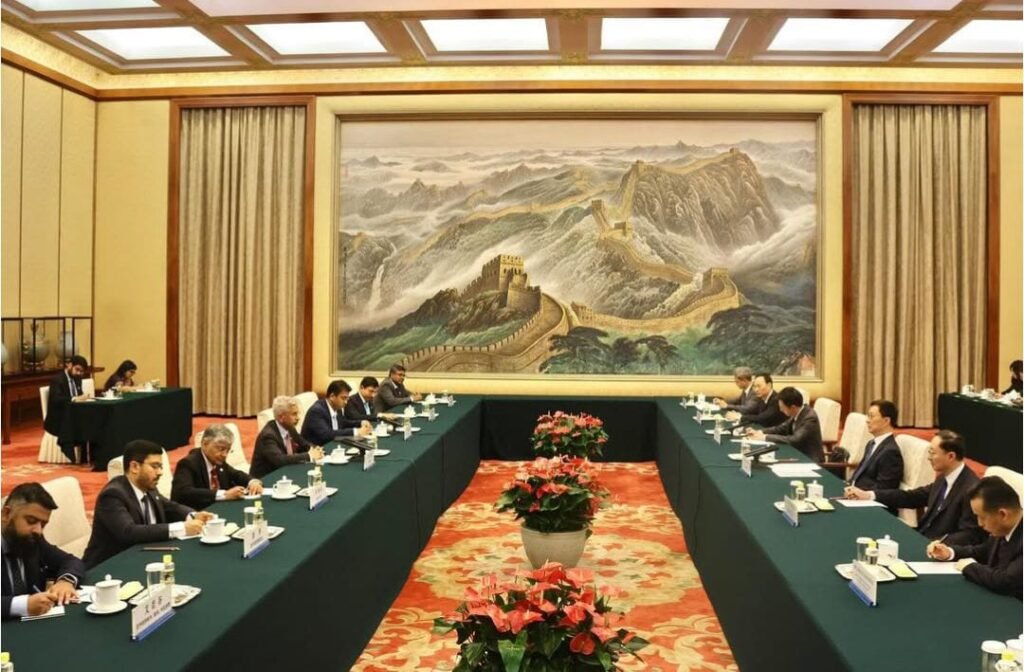In a world increasingly marked by intricate geopolitical shifts and economic uncertainties, the role of sustained diplomatic engagement cannot be overstated. Against this backdrop, India’s External Affairs Minister, S. Jaishankar, recently embarked on a significant visit to Beijing to attend the Shanghai Cooperation Organisation (SCO) Foreign Ministers’ Meeting. His discussions with Chinese Vice President Han Zheng, characterized by a firm call for open dialogue, underscore India’s commitment to navigating the complexities of the current global landscape while nurturing the vital bilateral relationship with its neighbours.
Subramanyam Jaishankar Advocates Open Dialogue at Shanghai Cooperation Organisation meet in China, symbolizing India’s active participation in a key regional forum and its support for a successful Chinese presidency. In his opening remarks, he explicitly lauded China’s leadership within the organization, signalling a cooperative spirit on multilateral platforms. Beyond the SCO agenda, the core of Jaishankar’s mission revolved around the India-China relationship, a dynamic and multifaceted bond that has witnessed both challenges and opportunities.
A crucial aspect of the discussions was the acknowledgment of recent positive strides in bilateral ties. Jaishankar pointed to the meeting between Prime Minister Narendra Modi and President Xi Jinping in Kazan last October as a pivotal moment, setting a constructive trajectory. This recognition of upward momentum is significant, indicating a shared understanding that despite past complexities, there is a mutual desire to foster stability and progress. The External Affairs Minister expressed confidence that his visit would serve to “maintain that positive trajectory,” a testament to the belief that consistent high-level engagement is essential for nurturing goodwill and understanding.
Furthermore, Jaishankar highlighted the recent milestone of the 75th anniversary of the establishment of diplomatic relations between India and China. This historical marker serves as a reminder of the enduring nature of their ties, transcending contemporary fluctuations. The resumption of the Kailash Mansarovar Yatra, a revered pilgrimage, was also specifically mentioned as a tangible positive development, warmly received in India. Such gestures, seemingly small, carry considerable symbolic weight, contributing to a sense of normalcy and trust.
Jaishankar’s assertion that “continued normalisation of our ties can produce mutually beneficial outcomes” encapsulates the strategic vision behind India’s diplomatic outreach – that a stable and cooperative relationship between these two Asian giants has the potential to yield substantial dividends for both nations and the wider region.
Jaishankar’s assertion that “continued normalisation of our ties can produce mutually beneficial outcomes” encapsulates the strategic vision behind India’s diplomatic outreach – that a stable and cooperative relationship between these two Asian giants has the potential to yield substantial dividends for both nations and the wider region.
Perhaps the most salient point of Jaishankar’s address was his emphasis on the necessity of open dialogue in a “very complex” international situation. As neighbouring nations and major economies, India and China possess a unique vantage point on global affairs. The imperative for “an open exchange of views and perspectives” reflects a mature understanding that even with differing approaches or interests, direct and transparent communication is the bedrock of preventing misunderstandings and fostering common ground. In an era where geopolitical alliances are shifting and economic interdependencies are under scrutiny, the ability of major powers to engage in candid conversations becomes paramount for regional and global stability.
Subramanyam Jaishankar Advocates Open Dialogue at Shanghai Cooperation Organisation meet in China, this visit to Beijing was more than just a routine diplomatic engagement; it was a deliberate and strategic effort to reinforce the importance of dialogue, even amid a challenging global environment. By acknowledging recent improvements, highlighting historical connections, and advocating for continued normalization, India has signalled its commitment to a constructive relationship with China. The call for open dialogue between two of Asia’s most influential nations is not merely a diplomatic nicety but a pragmatic necessity, direct communication is the most effective means to navigate complexities, address differences, and unlock the immense potential for mutually beneficial outcome. In an increasingly interconnected world, the ability of India and China to maintain a stable and predictable relationship through continuous and open dialogue will undoubtedly play a pivotal role in shaping the future of the Indo-Pacific region and beyond.

The recent visit of India’s External Affairs Minister, S. Jaishankar, to Beijing for the Shanghai Cooperation Organisation (SCO) Foreign Ministers’ Meeting, and particularly his extensive discussions with Chinese Vice President Han Zheng, serves as a powerful testament to the enduring imperative of diplomatic dialogue in an increasingly intricate global landscape. Beyond the formal agenda of the SCO, Jaishankar’s nuanced approach underscored India’s strategic foresight: to actively shape, rather than merely react to, the evolving dynamics of its most significant bilateral relationship. By acknowledging recent positive strides while simultaneously advocating for uninterrupted, open communication, India has projected a mature and pragmatic foreign policy stance. This isn’t merely about maintaining a superficial peace; it’s about building a framework for predictability and trust in a relationship that, due to its sheer scale and geopolitical importance, impacts regional stability and global economic currents.
The emphasis on the 75th anniversary of diplomatic ties and the appreciation for the resumption of the Kailash Mansarovar Yatra are not just symbolic gestures. They are deliberate acknowledgments of a shared history and cultural exchange that transcend contemporary political divergences. Such overtures are crucial in humanizing diplomacy, fostering an environment where both nations can recognize the broader benefits of cooperation. In a world grappling with multiplex crises – from climate change and pandemics to economic fragmentation and geopolitical flashpoints – the ability of two major powers like India and China to maintain an “open exchange of views and perspectives” becomes not just desirable but absolutely essential. This continuous engagement offers a vital channel for understanding each other’s strategic compulsions, mitigating potential misunderstandings, and collaboratively addressing issues that defy unilateral solutions. Ultimately, Jaishankar’s visit reaffirms that in the grand theatre of international relations, the most potent tool for navigating complexity and realizing mutual prosperity remains the unwavering commitment to dialogue.
